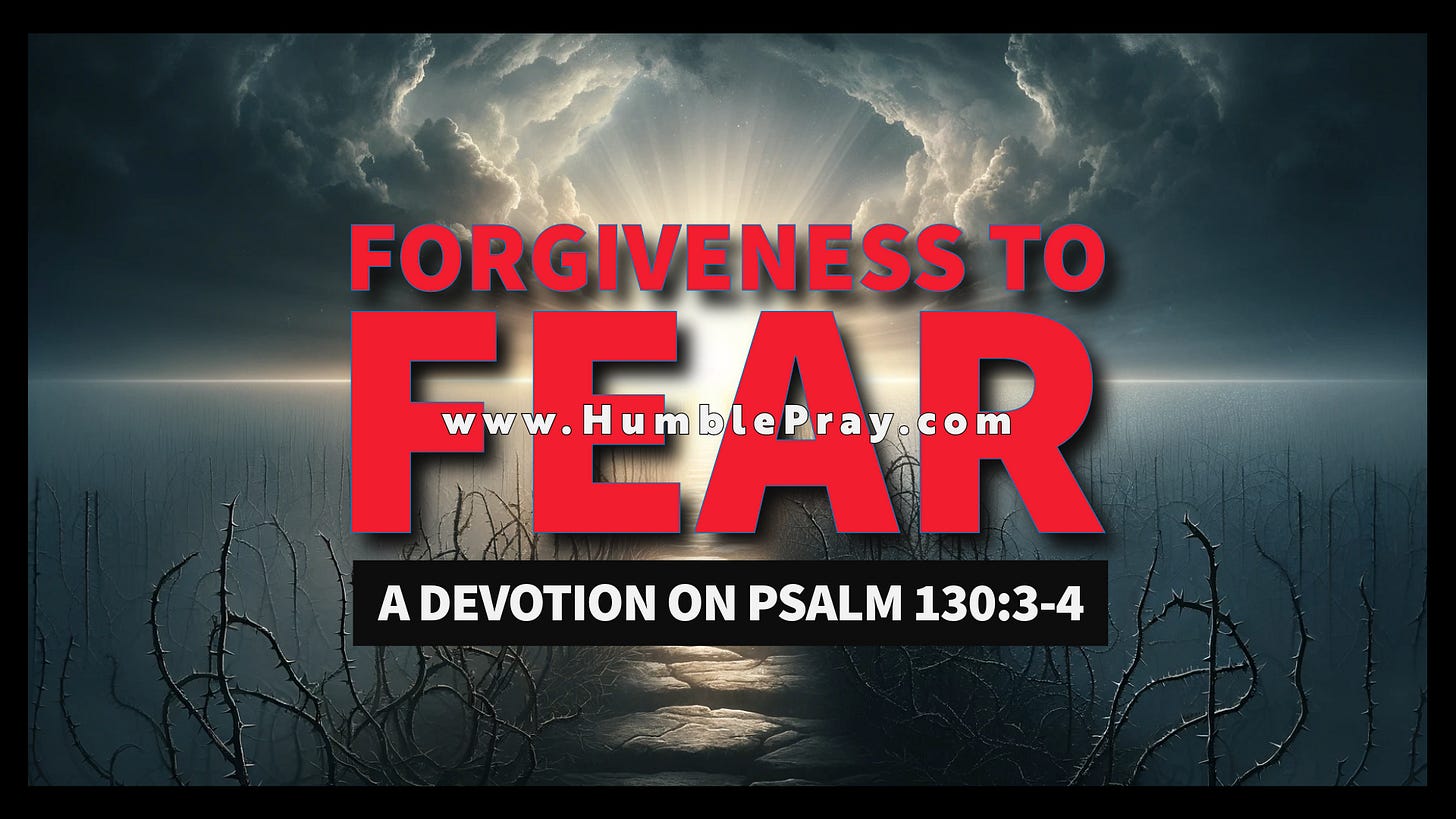Happy Good (Belated) Friday! For many Christians, today (yesterday) is (was) a day of special meditation and celebration of Jesus Christ's ultimate sacrifice—His life given for the forgiveness of our sins. I use "special" intentionally, as the enormity of Christ's sacrifice and the forgiveness we've received should perpetually occupy our thoughts.
Whether you observe Good Friday or abstain, we pray for God's blessings upon you. Now, for my first article in over a month (more on that later!)…
Introduction
My daily devotion brought me to Psalm 130, a succinct Psalm comprising only eight verses. It delves into themes like our inherent inability to stand before God without His forgiveness, our faith in God’s willingness to forgive, and the faith in God’s plan for redeeming His people. Indeed, this paragraph is almost as long as Psalm 130 is in its entirety.
In this article, we'll examine the paradoxical nature of God’s forgiveness, which the Psalmist writes, inspires fear, explore some aspects of Ancient Hebrew from a layman’s perspective, and invite meditation and discussion on why God’s forgiveness leads to a reverential fear of God, and why this fear is praised.
The Biblical Text: Psalm 130:3-4
To begin, we’ll start with the text itself:
If You should keep iniquities, O Yah, O Lord, who could stand?
But with You there is forgiveness, That You may be feared.
Note: Here, the text uses the shortened form of God’s proper name, Yahweh, Yah.
Study Resources
You're invited to explore Psalm 130 here on BibleHub, which also offers an interlinear view, Strong’s Concordance, and other valuable resources to enhance your study.
Understanding Fear Through "Yirah" and "Yare"
The Hebrew words "yirah" (יִרְאָה) and its verb form "yare’" (יָרֵא) unfold a spectrum of fear that spans from terror to reverence, and from awe to respect. This linguistic range reflects the diverse nature of our relationship with the Lord, encapsulating the complexity of emotions and attitudes directed towards God.
Semantic Domains and Their Impact
To fully understand "yirah/yare," it's important to know about semantic domains. This concept, which shows how words can mean different things in different contexts depending on grammar and syntax, is especially key in Ancient Hebrew. With its smaller vocabulary, Ancient Hebrew uses semantic domains to express complex theological ideas clearly.
Using English to demonstrate the concept, words with broad semantic domains, such as “set” or “run”, showcase how changing the words around them can drastically change what the words themselves mean or even their grammatical category. In contrast, words with a narrow semantic domain, like “icicle,” have more consistent meanings, think about it, there are many alternative meanings to icicle. Ancient Hebrew’s use of broad semantic domains allows for profound theological expressions with relatively few words, as seen in the rich layers of meaning within "yirah/yare".
The Broad Semantic Domain of "Yirah/Yare"
In Scripture, "yirah/yare" exemplifies a broad semantic domain, serving to convey complex theological truths through nuanced language:
Proverbs 9:10 highlights "yirah" as the beginning of wisdom, linking fear with deep respect and reverence for God’s majesty.
Exodus 20:20 uses "yare" to distinguish between terror and a constructive fear that leads to obedience, demonstrating the nuanced balance between fearing God and understanding His commands.
From Dread to Reverence
Understanding "yare" brings depth to how we perceive fearing God. Encountering the infinite God naturally evokes a sense of dread. This feeling is both natural and fitting, given the stark contrast between God's boundless majesty and our limited existence.
The phrase “that You may be feared” captures a fear that is rich in reverence. It signals a dynamic relationship between honor and dread, respect, and awe. As insightfully noted, standing before the infinite God, a sense of fear is inevitable and rational.
This blend of dread with reverence and awe provides a fuller picture of how we emotionally and spiritually respond to God. This understanding sets the stage to explore the idea that God's forgiveness instills a type of fear that is not only natural but also necessary and transformative.
The Psalmist’s Insight
Returning to our text, Psalm 130:4, "[W]ith You, there is forgiveness, that You may be feared," the use of "yare’" invites us into this layered understanding of fear. It's not just any fear but a profound reverence and awe that forgiveness itself can inspire. This fear is not terror, but an acceptance of the profound notion, “God is great, and I am not.”
Too often, we speak of redemption and mercy as counterpoints to God’s justice and wrath. “If you don’t do this, then this.” This fear of eternal judgment is dreadful. To meditate on it for more than a brief moment is bone-chilling: “If You should keep iniquities, O Yah, O Lord, who could stand?” Not only would a defense be impossible, but gripped with fear, we would collapse. There is a judgment so great and so terrible only God can render it, and we all know it (see Romans 1:18-21).
Yet, God speaking through the Psalmist, brings our thoughts to a possibility we very often do not consider: a forgiveness so awesome and absolving only God could conceive it, let alone succeed in delivering it. This forgiveness, the one which irresistibly draws the child of God to His mercyseat is also that which compels the Psalmist: “But with You, there is forgiveness, that You may be feared.”
To make my point clear: There is a mercy which only God can give, and the exercise of that mercy instills reverent fear and awe in those who receive it.
Knowing Fear without Mercy
Consider this: Many in our lives, in our families, and even in our churches don’t truly understand the fearful mercy of God, but only a fear of His wrath. They may hope God is “okay” with them, they are a “mostly good” person, but “okay,” “mostly,” or even “good” is not enough to satisfy God’s righteous requirements. As the Scripture states, “He who believes in the Son has eternal life; but he who does not obey the Son will not see life, but the wrath of God abides on him” (John 3:36 LSB). Somewhere in their minds, the fear of judgment looms (Romans 1:19-21).
“If You should keep iniquities…who could stand? I hope for Yahweh, my soul does hope, And for His word do I wait…It is He who will redeem…” (Psalm 130:3-4,5,8a LSB)
Desperately, they work for a forgiveness only God Himself could deliver, and only God can give.
The Gospel in a Nutshell
If you are that person, who cannot comprehend this idea of praising a fear of God, but only the gut wrenching anxiety which comes when you contemplate a judgment you want to pretend doesn’t await you, I call on you to do three things:
Repent of your sins, that is, turn your back on your sin
Believe in Jesus Christ as the Bible defines Him, as the Son of God, who came in the flesh, lived a perfect life, to die as a perfect atoning sacrifice for your sins, who now lives in Heaven, seated at the right hand of God
Publicly confess your new faith in God, not hide it, but make it known
9 that if you confess with your mouth Jesus as Lord, and believe in your heart that God raised Him from the dead, you will be saved; 10 for with the heart a person believes, leading to righteousness, and with the mouth he confesses, leading to salvation. (Romans 10:9-10 LSB)
No Time To Wait
If you do not believe, today is the day of salvation. Today is the day to be made right with God. Not tomorrow, not later, not when you’ve made yourself right—because only Christ can do that—not when you’ve enjoyed life a little more. Today.
Final Thoughts & Reflections
In a few days, we celebrate Christ’s death, burial, and resurrection. In about a decade, we will celebrate the 2,000 year anniversary of this history-defining event. Since Christ’s earthly ministry two millennia ago, His Church has gone from a few thousand followers in a small territory of the Roman Empire, to, just counting those alive on the earth right now, more Christians than were people alive on the planet at the time of His Ascension — not counting the tens or even hundreds of millions more asleep in the Lord.
If you already have come to saving faith, step out in obedience, and share the gospel with someone. Have faith God’s word will not return to Him void, but accomplish His good pleasure. Let’s resurrect an old Easter tradition of sharing the gospel.
Question for Discussion & Reflection:
How does Psalm 130:3-4 affect your understanding of fear and God? Do you agree with my conclusions? Why or why not? What would you like to add?





